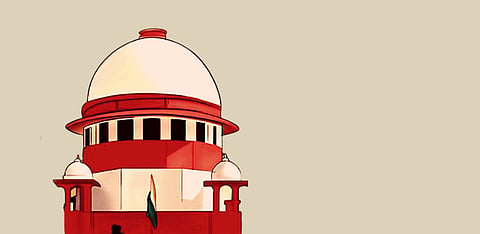

While Professor G. Mohan Gopal explained how the EWS reservation eats up equality of opportunity, senior advocates Meenakshi Arora and Sanjay Parikh mounted their attack on other grounds.
——
THE Supreme Court earlier today began hearing the arguments on a batch of petitions assailing the validity of the Constitution (One Hundred and Third Amendment) Act, 2019 that provides for a ten per cent quota to economically weaker sections ('EWS') of citizens in admission to educational institutions, including private educational institutions. The lead petition is Janhit Abhiyan versus Union of India. The petitions are being heard by a five-judge Constitution Bench comprising the Chief Justice of India U.U. Lalit, and Justices Dinesh Maheshwari, S. Ravindra Bhat, Bela Trivedi and J.B. Pardiwala.
Legal scholar and advocate Prof. G. Mohan Gopal mounted an attack on the validity of the 103rd Constitutional Amendment, calling it a fraud on the Constitution. He termed the EWS reservations introduced by the amendment as an attack on the constitutional vision of social justice. He added that the amendment has taken out the 'backwardness' from the purview of this vision, thus eating up the equality of opportunity, which is the concern of the backward classes.
"Social Justice is the heart and soul of the Constitution. The 103rd amendment seeks to nullify the preference given to lesser humans. It stabs the Constitution in its heart", Gopal argued.
The impugned amendment alters the "identity" of the Constitution from being a charter for social revolution as laid down by the Supreme Court in S.P. Gupta versus President of India & Ors. (1981), to being a guardian of caste privilege.
Prof. Gopal further added that the EWS quota inverted the concept of reservation as a tool of representation for disadvantaged groups and converts it into a scheme of financial upliftment. He contended that the EWS quota amounts to a violation of the basic structure of the Constitution since it excludes socially and educationally backward classes ('SEBCs'), and confines the benefits only to the 'forward classes', which in turn results in violation of the principles of equality and social justice.
Prof. Gopal asserted that the EWS quota is the first caste-based quota because the quota prior to the 103rd amendment had been based on social and educational backwardness, and lack of representation. However, the 103rd amendment excludes the backward classes from its purview, and the same is available only to the poor among forward classes. He pointed out that in several states, several Brahmin communities who are victims of social discrimination have been given benefits under Other Backward Classes ('OBC') reservation.
He contended that the reservation for classes that are already over-represented is unconstitutional because it entrenches the domination of oligarchic classes, damaging the goal of a representative, democratic government. Prof. Gopal submitted that the 103rd amendment nullifies inter-group equality. He pointed out from the Statement and Object of the 103rd Amendment that it seeks to provide reservation to EWSs on account of their financial incapacity to compete with persons who are economically more privileged, and the benefits of existing reservations under Articles 15(4), 15(5) and 16(4) of the Constitution are generally unavailable to them unless they meet the specific criteria of social and educational backwardness. To this, he argued that individual financial shortcomings cannot be the criteria for the reservation.
"Exclusion of backward classes is illegal. You tell the poorer person that you're not entitled because you're from a lower caste. This is happening on ground", Prof. Gopal submitted.
Prof. Gopal argued that the EWS reservation violates the Basic Structure norm of equality for the following reasons-
Senior advocate Meenakshi Arora argued that reservations are a class-based remedy to counteract historic injustice and provide reparations for classes who have been out of the power structure with a view to increase their representation, and to uplift them to the standard of other forward classes.
She submitted that reservations are not poverty-alleviation programs or political freebies. She sought to contend that the 103rd amendment is destructive of the equality code and the basic structure of the Constitution because it impermissibly discriminates against backward classes, it does not further the cause of substantial equality, and it destroys the reparative character of reservations.
Explaining further how the 103rd amendment discriminates against the backward classes, Arora submitted that EWS reservation need not be justified on the basis of "backwardness"; it has no logical endpoint, as there will always be people poorer than others in a capitalist system. There is no class, as "section" means people of all classes, regardless of backwardness or historical injustice; the government is free to choose any economic criteria for eligibility of this reservation, and there is no such requirement of balancing administrative efficiency for EWS.
Arora also contended that the 103rd amendment erased the principle of reparative justice from the Constitution because:
Senior advocate Sanjay Parikh also contended that 103rd amendment violates the basic features of equality principles because:
Parikh added that the width test as prescribed by the Supreme Court in M. Nagaraj, which applies to Articles 16(4) and 16(4A) of the Constitution, requires that reservations for SCs, STs and OBCs be based on data on backwardness and inadequacy of representation in services. However, there is no such compelling requirement under the Article 16(6) brought in by the 103rd amendment, in providing reservations for EWSs, excluding SCs, STs and OBCs – Non Creamy Layer.
Prof. Gopal, Arora and Parikh concluded their arguments today. The bench will hear senior advocate Prof. Ravi Verma Kumar tomorrow.